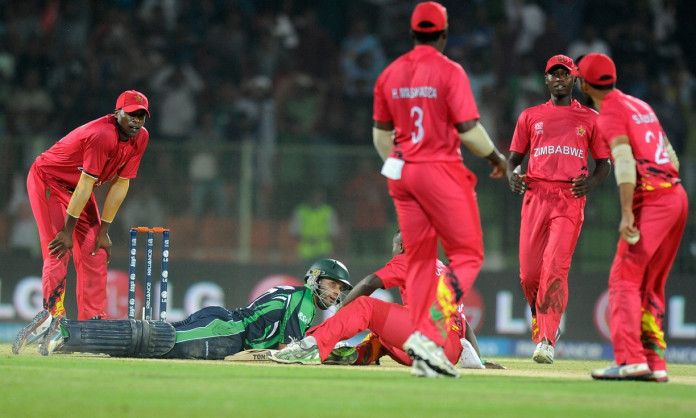
A couple of weeks ago, when Dave Richardson, the chief executive of theInternational Cricket Council, commented briefly on a sudden interest from elsewhere in promoting the idea of cricket as an Olympic sport, he made a valid observation.
“Cricket,” he said, “may be interested in the Olympics, but are the Olympics interested in cricket?” And therein is the fundamental hurdle for anyone who even thinks the idea has any legs.
For now there appears to be a tentative toe in the water from the International Olympic Committee, and next month the ICC will be meeting its representatives, at IOC instigation, to hear what it has to say. So why, then, might the IOC be doing this when there are so many other sports and pastimes competing for recognition?
For the 2020 Games in Tokyo no fewer than 26 sports federations, representing air sports, American football, baseball-softball, bowls, bowling, bridge, chess, dance sport, floorball, flying disc, karate, korfball, netball, orienteering, polo, racquetball, roller sports, sport climbing, squash, sumo, surfing, tug of war, underwater sports, waterski, wakeboard and wushu applied for Olympic status, of which a shortlist – skateboarding, surfing, baseball and softball, sport climbing and karate – will be cut to probably one or two in August. There is plenty of competition apart from cricket’s aspirations.
There is nothing wrong in the idea that Olympic representation of a sport regarded globally as fringe could lend it a profile in parts of the world where it has none and perhaps tap into money in new territories. But it is not that which attracts the attention of the IOC, which is more interested in the biggest potential market of all, India, and one in which it can see cricket as being a means of establishing a toehold in TV rights there. It wants a share of the market that cricket holds.
In this there is one huge problem, perhaps explained well by the former head of the IOC, Jacques Rogge, when speaking about baseball after it had been dropped from the 2012 Olympics. “To be on the Olympic programme is an issue where you need universality as much as possible,” he said. “You need to have a sport with a following, you need to have the best players and you need to be in strict compliance with the World Anti-Doping Agency, Wada. And these are the qualifications that have to be met.” He then talked about winning not just minds but hearts.
Addressing each of these points: cricket has a following but it is by no means global – although ICC has 105 members, 57 are affiliates, most with minimal structure or player base, and it is parochial. In wanting to include the best players there is a supposition that firstly they would be available, and secondly suitable to a format. And last, but perhaps most important, the Board of Control for Cricket in India does not in any case comply fully with Wada, the bone of contention being the “whereabouts” clause, which in essence states that players from the International Registered Testing Pool may be tested at any time during one designated quarter of the year.
The player has to report at any time for an hour every day during the period. If the player cannot make it to the test, he or she must notify Wada officials. However, if they fail to turn up for the test at the given time, a strike will be put across their name and three such strikes would mean a two-year suspension. The BCCI has been against this particular clause as it says it invades privacy and is against its ethics code, especially during the off-season.
Without India, the whole premise on why IOC has an interest disappears. The ICC, for its part, would see an Olympic tournament as diluting the value of its own global competitions.
But these are not the only reasons why it simply cannot work. Recently Shane Warne and Sachin Tendulkar have waxed enthusiastically about why Twenty20 cricket is the ideal Olympic format, but even this form of the game takes three hours and more.
A summer Olympics lasts a fortnight, and by comparison the last World T20, with 16 teams, required 21 days. Even T20 is too long, so it would have to be sixes, or double-wicket.
Beach cricket and indoor cricket have even been suggested as a serious option. But then women’s cricket has to be factored in (actually this is where the real growth of the game could come, especially China and the US), and also Paralympics, with formats compliant with that. How the Olympics deals with reinstated baseball would be instructive. That hitherto it has been an eight-team tournament only, with lengthy pre-qualification, rather devalues the evangelical ideal that cricket’s supporters carry.
Strictly speaking, the only Olympiads since the second world war to have had the capacity to stage cricket were the two in London and two in Australia. Venues, though, can be made using artificial pitches and temporary stands. When it comes to the ECB, the problem arises as to sphere of influence: this would need to be a Great Britain team, so under whose auspice would it come?
Would the best players be available for what would be a month mid-season? Doubtful with the nature of scheduling. Should the competition be for amateurs only then? Perhaps, but then that would not fit Rogge’s ideal. And what would happen to West Indies? Islands compete as themselves and already there is talk that Trinidad would like to play international cricket as itself. Would that be the end of West Indies? Who will be responsible for anti-corruption?
So many questions and so few answers. There is a lot of zeal and a deal of naivety. In the end, though, IOC interest and ICC reluctance boils down to money. It was ever thus.






















